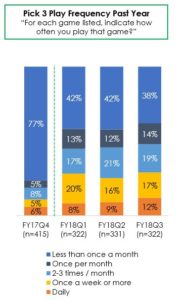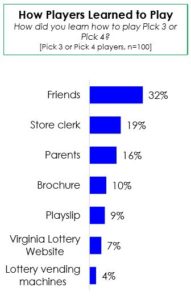
Untold thousands of Virginians just poured their money into the recent multi-state Mega Millions drawing won by someone in California. Governor Jerry Brown sends his thanks for his cut. But based on a recent news release our own governor is also very pleased with the performance of the Virginia Lottery as it approaches its 30th anniversary.
As with any other game of chance, the house has many ways to win.
Years of debate in the General Assembly led to a November 1987 lottery referendum, which passed with about 57 percent in favor. The games started less than a year later. According to information on the Virginia Lottery website, and plugging in the unaudited totals from fiscal year 2018, over 30 years the lottery has:
- Received from players $37 billion in cash (sales).
- Returned about $21 billion of that back to players in prizes. The net after taxes is not reported, so that might really be about $16 or 17 billion.
- Transferred about $12.5 billion to the state earmarked for education (but there is no proof local schools are better funded than they would otherwise be.)
- Spent about $2 billion on its own overhead and advertising and another $2 billion on compensation to retailers. (State and local taxes gets a cut of that, too.)
Neighboring lotteries were rare initially, but now all surrounding states have joined in taxing people who don’t understand probability. Maryland has taken the additional plunge into casino gambling. Strip away the masquerade and Virginia is right behind with the new “historical horse racing” which will allow 3,000 slot machines.
This has become a big business, more than twice the size of Virginia’s liquor sales through the ABC. The bare-bones cash flow summary on the Virginia Lottery website is supplemented by details in the annual reports and survey information provided to Bacon’s Rebellion upon request.
With all the attention given to the large national lotto games, the bulk of Virginia’s revenue comes from the scratch-off games and the daily Pick 3, 4 or 5 games intended to mimic the illegal numbers racket. Last year’s annual report stated the scratch-off revenue represented 56 percent of sales and the simple numbers games 30 percent.
Regular market surveys are based on a rolling 100 interviews per week or 1,300 per quarter, a very strong methodology, and you can see a recent report here. If indeed 70 percent of adult Virginians have played in the past year, that’s about 4.6 million individuals. That puts the annual average revenue per player at $465, but of course most of players spend far less.
Which means quite a few Virginians are spending far more. Who are they? How much do they spend? The data shared does not include that, but there are some hints.
In the first three quarters of the year 7 percent of scratch-off players – the source of the big money – report a daily payment, and another 23 percent do it weekly. For the popular Pick 3 game 12 percent reported playing daily in the most recent quarter, and another 17 percent at least once per week. Since 23 percent of players play the numbers a conservative estimate would be 100,000 or more Virginians playing a daily Pick 3, 4 or 5 game and maybe up to 150,000 more playing weekly.
The internet is filled with studies on the addictive nature of these games, the quick bankruptcies that often follow big wins and indications that the people spending the most can least afford it, but nothing recent on Virginia popped up. Question the wisdom of this and you will get the same responses that were used 30 years ago – this is a matter of choice, if the state wasn’t cashing in the illegal games would flourish, and the always popular “if those fools want to lower my taxes, great.”
During the 2018 General Assembly Senate Bill 192 (sponsor Senator Mark Peake, R-Lynchburg) would have required the lottery to cross check with the Department of Social Services to see if any winner collecting $25,000 or more had been receiving cash under the Temporary Assistance for Needy Families (TANF) program. The fiscal impact statement on the bill included multiple reasons why this would be hard, but did include the tidbit that about 400 winners hit that level per year, or 1 in 11,500. The bill passed the Senate but failed in the House.
There is already a long line of people waiting to collect debts against those prizes. Last year $2.1 million was held back to cover unpaid taxes, unpaid court fines, unpaid child support. Another $12 million in unclaimed prizes was put in the state Literary Fund. If you assume Virginia keeps about 4-5 percent of the winnings as state income tax, that’s another $50 to 60 million. When you see the advertised prize totals be sure to deduct those categories mentally, plus about 25 percent for federal taxes.
One final way the house wins? As surety for the games that pay out with annuities in various forms, the lottery holds $122 million in U.S. Treasuries on its books against that $175 million future liability.


Leave a Reply
You must be logged in to post a comment.